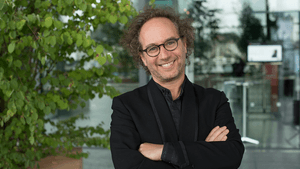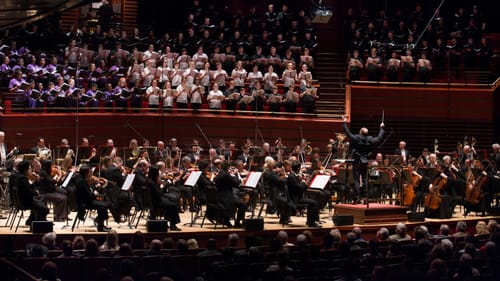Stay in the Loop
BSR publishes on a weekly schedule, with an email newsletter every Wednesday and Thursday morning. There’s no paywall, and subscribing is always free.
Bold Bernstein, shaky 'Voices'
Philadelphia Orchestra presents 'Philadelphia Voices'

This year’s Leonard Bernstein centenary brings with it a renaissance of interest in his music. This weekend, Yannick Nézet-Séguin and the Philadelphia Orchestra performed Bernstein's Chichester Psalms with the Westminster Symphonic Choir under Joe Miller.
Commissioned by Chichester Cathedral during the composer’s 1964-65 sabbatical from his post as conductor of the New York Philharmonic, this is a bracing work. It pits electrifying bursts of energy with tender melodies and piquant choices in instrumentation. The piece includes complete settings of Psalms 23, 100, and 131, with selected verses from 2, 108, and 133, sung in Hebrew with English supertitles projected above the performers.
Bernstein’s imagination is apparent throughout. He makes surprising choices, such as interrupting a boy soprano’s gentle solo (“Temuri Tavelishvili”) of the 23rd Psalm with the chorus’s abrupt “Why Do the Nations Rage?” from Psalm 2. He then returns to the lyrical solace of the 23rd’s familiar closing lines.
Sounds of our city
The welcome sight of dozens of schoolchildren milling about the Kimmel lobby was a sign something exciting would happen, and indeed it did. The second work on the program was Tod Machover’s Philadelphia Voices, a pastiche of songs, snippets from interviews and the news, and electronic effects expressing what young people think and feel about their hometown.
Machover, a professor of music and media at MIT, is creating a series of similar compositions called “City Symphonies.” The works combine soundbites contributed by locals and Machover’s considerable musical and electronic-media gifts.
Three choirs of bright-eyed children joined the orchestra, Nézet-Séguin, the organ, and Westminster. But in the end, the performance felt like a big humanities project unveiled during assembly at a progressive high school. It also needed to be cut by about 10 minutes and the decibel level lowered by 50.
I applaud the orchestra’s commitment to living composers and nontraditional programming, and in particular to listening to the voices of young people. After all, these children are change agents in several current national discussions.

There is no doubt the poetry contributed by talented Philadelphia youth as part of this project is sincere and authentic. Some of the more critical verses reminded me of the lead character in Lady Bird lamenting life in Sacramento. Still, for my taste, the work was a fish out of water, suited to a different venue of less behemoth proportions.
Lilies from mud
The program’s final work was the glorious Ravel transcription of Mussorgsky’s Pictures from an Exhibition. Ravel’s colorful orchestration takes advantage of the gifts of each section and principal in the orchestra, from the flamboyant opening trumpet to the final closing of the Great Gate of Kiev with bells, cymbals, and Russian chant. In between, we meet a gnome, dancing chicks, a castle, playful children, and a host of other scenes from fairy tales and 19th-century Euro-Russian life.
The work depicts a stroll through an art gallery, where the visitor walks from one painting to another. The pictures (now lost or destroyed during war) were by Mussorgsky’s friend, Viktor Hartmann, who died in 1873, just a year before the exhibition (and this composition). In 1922, Maurice Ravel arranged the work for orchestra in the version we know today.
Despite the inspired beauty of this and a few other masterpieces, Mussorgsky, by all accounts, was a wastrel and anti-Semite who died at 42 from alcohol abuse. One of life’s most tantalizing mysteries is how depraved individuals can produce art of enduring loveliness, like lilies rising out of mud.
The inexhaustible Nézet-Séguin led the orchestra through a half-hour’s dazzling variety of moods and musical hues, having wonderful fun as though discovering the music for the first time. What better way to leave a concert than with the powerful anthem of the Great Gate either closing behind us or opening up ahead, welcoming us to a new and better world?
What, When, Where
Philadelphia Voices. Westminster Symphonic Choir, Joe Miller, conductor; Dante Michael DiMaio (April 5) and Temuri Tavelishvili (April 6 and 7), boy soprano; Keystone State Boychoir and Pennsylvania Girlchoir, Steven M. Fisher, artistic director; Sister Cities Girlchoir, Alysia Lee, artistic director; Ben Bloomberg, audio technology; Yannick Nézet-Séguin, conductor. Chichester Psalms, by Leonard Bernstein; Philadelphia Voices, by Tod Machover; Pictures from an Exhibition, by Modest Mussorgsky. Philadelphia Orchestra. April 5-7, 2018, at the Kimmel Center's Verizon Hall, 300 S. Broad Street, Philadelphia. (215) 893-1999 or philorch.org.
Sign up for our newsletter
All of the week's new articles, all in one place. Sign up for the free weekly BSR newsletters, and don't miss a conversation.

 Linda Holt
Linda Holt